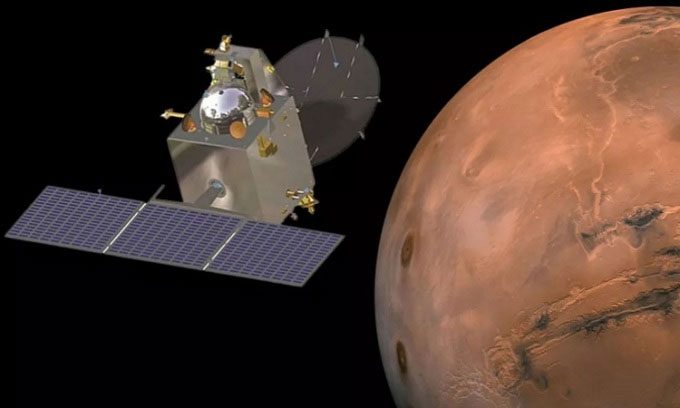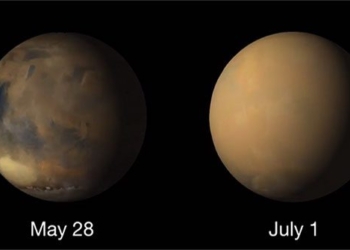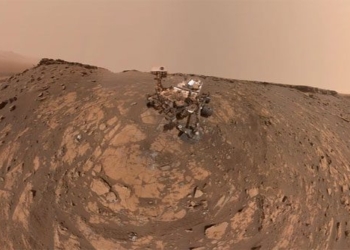The Mars Orbiter Mission (MOM) spacecraft from India may have concluded its operations after 8 years orbiting the Red Planet.
Ground stations operated by the Indian Space Research Organisation (ISRO) have lost contact with the MOM spacecraft. The exact cause has not been clearly identified. The orbiter may have run out of fuel. The spacecraft’s battery may have depleted beyond safe operational limits, or an automatic operation may have severed communication, Space reported on October 3.

Simulation of MOM in Martian orbit. (Photo: ISRO)
After 8 years of operation in Martian orbit, MOM, also known as Mangalyaan, has far exceeded its expected mission duration of 6 to 10 months. The spacecraft was launched in November 2013 and entered orbit around Mars in September 2014. Although ISRO has not made an official announcement, The Hindu has reported that the spacecraft’s battery has depleted and communication has been lost.
MOM is equipped with wings measuring 1.4 x 1.8 meters, featuring 3 solar panels on each side of the spacecraft. The power system can generate 800 watts on Mars and charge lithium-ion batteries, but the spacecraft has recently faced a series of eclipse events that may have affected its charging capability. “Recently, there have been numerous eclipse events, including one lasting 7.5 hours,” an ISRO official stated. “The spacecraft’s battery was designed to sustain operations during eclipse durations of about 1 hour and 40 minutes. Longer durations could deplete the battery beyond safe limits.”
MOM experienced a long eclipse in April, but when it resumed operations, the spacecraft may have used up its remaining fuel. At the time of launch, MOM carried approximately 852 kg of fuel to power its main propulsion engine and 8 smaller engines used for altitude control. Researchers also do not rule out the possibility that communication was interrupted due to MOM’s automatic systems taking the spacecraft out of another eclipse event. This system could cause the spacecraft to orbit in a circular pattern, leading to MOM’s antenna pointing away from Earth and severing communication.
Previously, MOM had successfully overcome two communication blackouts during its first and second years on Mars, fully recovering autonomously without ground support. However, initial signs indicate that this communication loss may be permanent. Regardless of the cause, the spacecraft will not resume operations.
MOM is India’s first interplanetary mission, making ISRO the fourth space agency to successfully send a spacecraft into orbit around Mars. The primary objective of the mission was to test the technology necessary for interplanetary exploration and to utilize instruments to study both the surface and atmosphere of Mars from orbit.
The instruments onboard include a color camera, an infrared thermal sensor, an ultraviolet spectrometer used to study deuterium and hydrogen in Mars’ upper atmosphere, and a mass spectrometer to analyze neutral particles in the outer layer of the atmosphere. MOM is also equipped with a sensor designed to search for methane, a molecule that could hint at past life on Mars.





















































